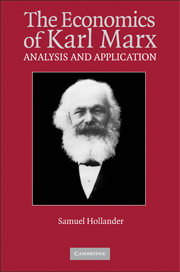Book contents
- Frontmatter
- Contents
- Preface
- Introduction
- Part One CAPITAL: PRINCIPLE FEATURES OF THE MARXIAN “CANON”
- 1 Value and Distribution
- 2 Elements of Growth Theory
- 3 Economic Growth and the Falling Real-Wage Trend
- 4 Economic Growth and the Falling Rate of Profit
- 5 The Cyclical Dimension
- Part Two ORIGINS: MARX IN THE 1840s
- Part Three A “SECOND DRAFT” OF CAPITAL: THE GRUNDRISSE 1857–1858
- Part Four A “THIRD DRAFT” OF CAPITAL: THE ECONOMIC MANUSCRIPTS 1861–1863
- Part Five TOPICS IN APPLICATION
- Conclusion: A Recapitulation and Overview
- Appendices
- Bibliography
- Index
2 - Elements of Growth Theory
Published online by Cambridge University Press: 25 June 2009
- Frontmatter
- Contents
- Preface
- Introduction
- Part One CAPITAL: PRINCIPLE FEATURES OF THE MARXIAN “CANON”
- 1 Value and Distribution
- 2 Elements of Growth Theory
- 3 Economic Growth and the Falling Real-Wage Trend
- 4 Economic Growth and the Falling Rate of Profit
- 5 The Cyclical Dimension
- Part Two ORIGINS: MARX IN THE 1840s
- Part Three A “SECOND DRAFT” OF CAPITAL: THE GRUNDRISSE 1857–1858
- Part Four A “THIRD DRAFT” OF CAPITAL: THE ECONOMIC MANUSCRIPTS 1861–1863
- Part Five TOPICS IN APPLICATION
- Conclusion: A Recapitulation and Overview
- Appendices
- Bibliography
- Index
Summary
Introduction
This chapter provides a transition from the micro-economic issues relating to valuation and pricing of individual commodities to the macro-economics of growth. We shall set off with a preliminary discussion of “simple” or stationary reproduction which Marx, following Hodgskin, envisaged as a circular-flow process (Section B), and then proceed to his analysis of capital accumulation and its determinants with particular reference to the “motives” governing savings decisions (Sections C and D). The remainder of the chapter seeks to provide an elementary account of both the celebrated “simple” and “extended reproduction” departmental schemes of Capital 2 (Sections E and F). We point in particular to the apparent inability of the departmental device to explain the transition from a stationary to a growing economy. (The device, we may point out here, is not used in discussion of the falling wage and profit rates during the course of growth, the subject matter of Chapters 3 and 4, but is applied in cyclical analysis as we shall see in Chapter 5.) An Appendix outlines Marx's objectives to Adam Smith's national-income accounting.
Setting the Stage: Stationary Reproduction as Circular-Flow Process
Capital 1 on “Simple Reproduction” (Chapter 23) explains the process whereby money is “converted into means of production and labour power”; these latter “converted” via the production process intocommodities “whose value exceeds that of their component parts, and, therefore, contains the capital originally advanced, plus a surplus value”; the value of those commodities then realized againstmoney in the market; and the process repeated “over and over again”(MECW 35: 564).
- Type
- Chapter
- Information
- The Economics of Karl MarxAnalysis and Application, pp. 55 - 84Publisher: Cambridge University PressPrint publication year: 2008



